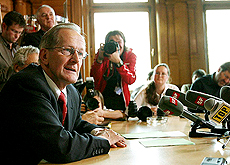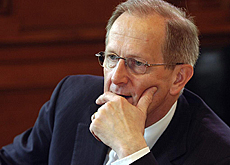Economics Minister Deiss resigns

Joseph Deiss has announced his resignation, effective at the end of July, after seven years as a member of the cabinet.
The 60-year-old Christian Democrat explained his surprise decision by saying he wanted to make way for new blood.
Deiss told a news conference on Thursday morning that seven years as a cabinet minister and a quarter of a century in politics was enough.
He said he was stepping down voluntarily at a time when Switzerland’s international reputation was good, and during an economic upturn.
Deiss said one of his best memories as cabinet minister was watching the Swiss flag hoisted outside the United Nations building in New York in 2002, marking Switzerland’s accession to the world body.
The economics minister from canton Fribourg thanked his party for its support, and said his decision provided the Christian Democrats with ideal preconditions for next year’s parliamentary elections.
Pressure?
Deiss’s announcement follows some speculation in the Swiss media that he has been under pressure from his party to step down, to allow for a more charismatic personality to help lead the centre-right party into the polls.
However, the Christian Democratic leadership said in a statement that it “deeply regretted” his resignation, although it accepted his decision.
The party gave him credit for playing a key role as foreign minister in convincing the electorate to vote in favour of UN membership, his “excellent work” bringing Switzerland closer to the European Union, and for successfully introducing economic reforms.
But a first reaction from the rightwing Swiss People’s Party – the largest in parliament, was harsh. The People’s Party president, Ueli Maurer, called him a “relatively unsuccessful cabinet minister”.
Surprised
The president of the centre-left Social Democrats, Hans-Jürg Fehr, called the announcement a surprise. He applauded the economic minister’s intelligence and contributions.
This year’s Swiss president, Moritz Leuenberger, like Fehr a Social Democrat, lauded Deiss’s non-partisan approach to politics and his ability to see the big picture.
The head of the centre-right Radicals, Fulvio Pelli, said he could understand why the Christian Democrats would prefer to look for a successor now than when the 2007 election campaign is in full swing.
Parliament elected Deiss to the cabinet in 1999 to succeed the Christian Democratic foreign minister, Flavio Cotti. In 2003, he moved from the foreign ministry to take over the economics portfolio.
In the same year, he became the sole Christian Democratic minister when his party colleague, the justice minister, Ruth Metzler, was voted out by parliament in favour of a second seat in the seven-member cabinet for the Swiss People’s Party, which had become the largest party in parliament.
Parliament will choose a successor to Deiss during its summer session.
swissinfo with agencies
Joseph Deiss was born in Fribourg in 1946.
The professor of economics was a member of canton Fribourg’s cantonal parliament from 1981-1991.
He also served as mayor of the Fribourg village, Barberêche, from 1982-1996.
He was elected to Switzerland’s House of Representatives in 1991, and was the Swiss price regulator from 1993-1996.
He joined the cabinet in 1999 as foreign minister, and took over the economics portfolio in 2003.
Executive power in Switzerland is vested in the seven-member cabinet. Members are elected, re-elected or – extremely rarely – dismissed by parliament.
Elections for a new legislature are held every four years, and it is not uncommon for cabinet members or ministers to stay in office for ten years or more, although most change portfolios during that time.
The 2003 parliamentary elections upset the so-called “Magic Formula” which dictated the cabinet makeup for more than 40 years.
The success of the Swiss People’s Party at the polls allowed them to claim a second cabinet seat, taking one of the two seats traditionally held by the Christian Democrats.
The Radicals and Social Democrats each hold two of the other four seats.

In compliance with the JTI standards
More: SWI swissinfo.ch certified by the Journalism Trust Initiative

You can find an overview of ongoing debates with our journalists here. Please join us!
If you want to start a conversation about a topic raised in this article or want to report factual errors, email us at english@swissinfo.ch.